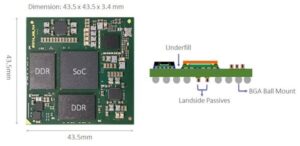Entering an era of Smart Driving with advanced driver’s cockpit systems
With the development of electric vehicles and advanced driver-assistance systems, the automotive industry is entering a rapidly evolving era of smart driving. To enhance performance and passenger experience, numerous automakers are actively incorporating cutting-edge electronic devices and technologies, striving to achieve more advanced driver’s cockpit systems.
USI, Universal Scientific Industrial (Shanghai) Co., Ltd., is a global leader in electronic design and manufacturing as well as a leader in the field of SiP (System-in-Package) modules.USI is a subsidiary of ASE Technology Holding Co., Ltd. (TWSE: 3711, NYSE: ASX).
USI (SSE: 601231) is working with multiple automotive SoC solution providers (TP) to accelerate the development of smart cockpit systems. They are leveraging their years of expertise in System-in-Package (SiP) and System-on-Module (SoM) modules to reduce the size of automotive compute modules while ensuring the highest operational speed of DDR (dynamic random-access memory). This collaboration will help advance the development of smart cockpit systems and enable the creation of more efficient and effective automotive solutions.

Modern smart cockpit systems have expanded their functionalities beyond basic infotainment features like CD players, USB, and Bluetooth connectivity. They now offer a wide array of rich features such as passenger entertainment displays, panoramic assistance displays, heads-up displays, digital instrument clusters, driver and passenger detection, voice-controlled temperature adjustment, voice-controlled music playback, and message transmission. These advancements provide drivers with a luxurious cockpit experience akin to that of an aircraft, enhancing comfort, improving handling performance, and reducing driver fatigue.
Smart cockpit systems not only fulfill the role of a mobile personal entertainment centre but also continuously innovate in line with the evolving trends of artificial intelligence (AI) assistance, advanced connectivity (C-V2X), advanced driver-assistance systems (ADAS), and software-defined vehicles (SDV). These trends will further drive the development of smart cockpit systems in the following application scenarios:
- Intelligent Human-Machine Interface: Touchscreen interfaces have become the mainstream method of interaction today. In the future, however,with the gradual integration of artificial intelligence (AI) assistance, traditional physical touchscreens may gradually be replaced by advanced voice control, gesture control, and even eye-tracking control
- Diversified Cabin Functions: The future smart cockpit will integrate fully autonomous driving technology and become a versatile centre for smart office and entertainment. Drivers and passengers will be able to engage in office work, meetings, multimedia entertainment, and other activities within the vehicle cabin.
Based on these development trends, it is evident that there will be a significant increase in market demand for System-on-Chips (SoCs) and active/passive electronic components.
Other companies that offer System on Chips (SoCs) for the automotive industry apart from USI include Cadence, Renesas, Synopsys and STMicroelectronics.The automotive SoC market is expected to grow at a CAGR of 7.8% during 2022-2028.
Overall, smart cockpit systems will offer several benefits to drivers, including enhanced comfort, intuitive and efficient human-computer interaction, improved safety, personalization, and future-proofing.
Picture Source: UNIVERSAL SCIENTIFIC INDUSTRIAL (SHANGHAI) CO., LTD